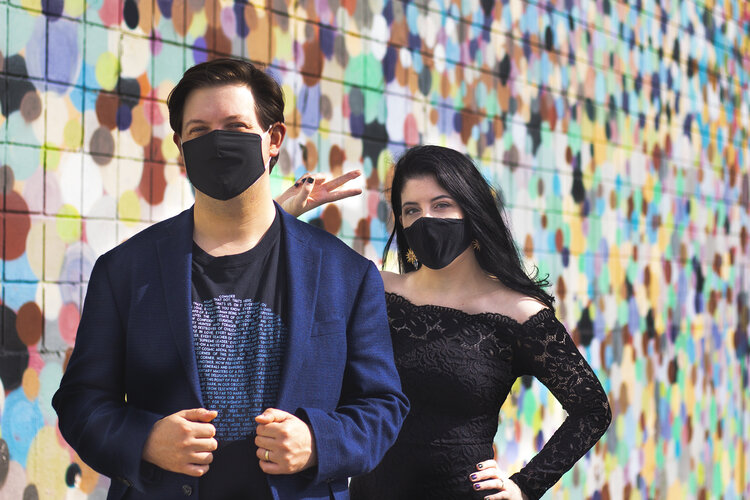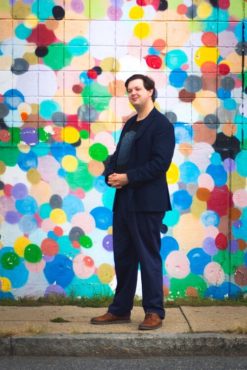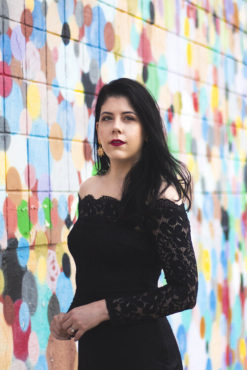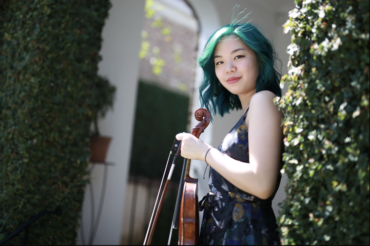
Composer David Ibbett and Soprano Beth Sterling
For someone to say that they aren’t fascinated by Outer Space, I would argue that they simply haven’t examined it enough. Endlessly vast, continuously sprawling and filled with wonderment unknown. Ever since man decided to look past the sky, the World has only appeared smaller to us living on it. For many scientists and stargazers alike, it has also inspired them to know more.
Many methods have been deployed in mankind’s quest for intergalactic answers to extra-terrestrial questions: Space shuttles, satellites, astronaut primates, and really really really powerful telescopes. However even the most powerful of telescopes don’t stand a chance at recognizing that which exists at the edges of our universe. For those matters, we must turn to our other senses for recognition.

This was the case for classical composer and scientist at heart, David Ibbett (pictured left). Born with a chemist for a father, Ibbett was surrounded by science all his life. While developing his skill and appreciation for music, the pursuits of science were never far behind. Now a classically trained composer, Ibbett has created the Multiverse Series. Touching on a wide range of topics, all grounded in the world of science, from black holes, polymers, the health of our coral reefs and the patterns in nature. The latest installment, Octave of Light, reaches farther than the rest, finding music in Exoplanets, or planets outside of our solar system.
Having used this technique for other Multiverse installments in the past, Ibbett, along with Roy Gould of the Harvard-Smithsonian Center for Astrophysics, have “sonified” (turning light to sound) various shadows casted by Exoplanets across their parent star. “Even a little dot is enough to separate out colors but the next problem is those colors are outside of what we can see… but we can listen to them instead. The ear can take in a lot more frequencies than the eye,” explains Ibbett. Using signals retrieved from these distant regions of space, through sonification, “we can learn more about the color of these planets and that tells us what they’re made of, what’s in the atmosphere, clues that they could harbor life.”
Now Ibbett must take these light frequencies and apply them to corresponding musical notes. “They have to be shifted down to be audible… around 30-40 octaves. But the relationship between the notes is preserved. There’s a real story that these planets and elements tell.” Such as matching notes to the chemical makeup of methane and oxygen (both of which David played for me during our phone call to reveal beautiful melodies) that allows scientists to see shifts & patterns in those signals, all possibly leading to more signs of life. David does stop to mention how “you can get the technique down but that doesn’t mean [what comes out] is going to sound good. And it has to sound good, it has to have some meaning or feelings. Sometimes I have to mull over it for weeks.”

Work on Octave of Light began around two years ago with a discussion between Ibbett and Roy Gould, which was the main inspiration for pursuing this project. David then began composing two of the works that appear on the album, before there were any plans to even make an album. While continuing to teach at the Yamaha Music School of Boston, in Lexington, Ibbett approached fellow teacher and Soprano Beth Sterling (pictured left) in Spring of 2019 to sample vocals on what would later become the opening track “Water Romanza”; a sprawling and gorgeous introduction to the world Ibbett has created, bolstered by Sterling’s impressive vocal. “A few weeks after recording, [David and I] talked about doing a whole song cycle for Octave of Light. As it developed David asked me to come on as an Associate Producer,” explains Sterling. “In October [2019] we had a concert preview for two of the songs “Water Romanza” and “Wanderers”, and again in January. By February we started a Kickstarter campaign to fund the rest of production which was done by early March.” One week later: COVID-19 shutdowns began to take effect.

In the following months, production was forced to move remote, with Ibbett, Sterling and violinist Amelia Sie (pictured right) sending each other fragments of songs for Ibbett to piece together at his home studio. In July, Sterling joined Ibbett in a socially distanced studio setup at his home to finish production. With Ibbett manning the controls in one room, and Sterling singing unmasked in another, the two would communicate through a headset. “It’s supposed to be a live album, but I can’t get all of us in the same room,” David remarks. However by September the album was complete.
Although no one involved would have said these were ideal conditions to rehearse/record under, there were some upsides to the isolation. Sterling adds, “we had a couple of virtual performances including one with the Museum of Science earlier this year that normally would not have come about.” Continuing to teach at the Yamaha School, Tufts University and her own Studio classes, Sterling also remarked how the remote learning model has allowed for more students from farther distances to enroll in her classes.
With the album complete and a release date in sight, the team was forced to shift their plans for a live premiere due to ongoing restrictions. Continuing to work with the Museum of Science, the crew have devised a combination live-stream/pre-recorded event on this Thursday, November 12th to showcase the album, visuals by the Charles Hayden Planetarium and discussions by Ibbett and the team. Another first in isolation saw Sterling filming on a green screen at the museum, footage from which will be used during the stream. Rounding out the event will be Dr. Clara Sousa-Silva delivering an update on the search for life on Venus following the recent discovery of phosphine within the planet’s atmosphere.
“I’m hoping I can tempt people into science through sound to want to learn more. I think there should be more science artists. Science seems kind of inaccessible, but if you ever ask a scientist they’re very happy to tell you all about it, to try to get you inspired.” David continues, “it’s the way science is taught in a kind of dry and technical way, but it’s all real, it’s all about the world as it is, we should all feel like we’re a part of this search. Artists want to communicate with the world about what’s important and to me, discovery is important. Knowing more about our place in the world. It’s an amazing time to be alive and we wanted to celebrate that through music, the universal language. It doesn’t matter where you’re from, music can reach you.”
Check out an exclusive preview of the album below!
Octave of Light premieres on Thursday, November 12th at 7 pm online. Reserve your free ticket for Octave of Light through the Museum of Science here. Check out more work in the Multiverse Series here. Find more information about Beth Sterling here.
